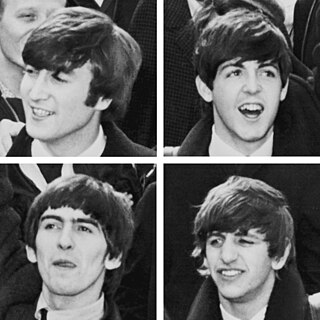
The Beatles were an English rock band formed in Liverpool in 1960, comprising John Lennon, Paul McCartney, George Harrison and Ringo Starr. They are regarded as the most influential band of all time and were integral to the development of 1960s counterculture and the recognition of popular music as an art form. Rooted in skiffle, beat, and 1950s rock 'n' roll, their sound incorporated elements of classical music and traditional pop in innovative ways. The band also explored music styles ranging from folk and Indian music to psychedelia and hard rock. As pioneers in recording, songwriting and artistic presentation, the Beatles revolutionised many aspects of the music industry and were often publicised as leaders of the era's youth and sociocultural movements.

Sgt. Pepper's Lonely Hearts Club Band is the eighth studio album by the English rock band the Beatles. Released on 26 May 1967, Sgt. Pepper is regarded by musicologists as an early concept album that advanced the roles of sound composition, extended form, psychedelic imagery, record sleeves, and the producer in popular music. The album had an immediate cross-generational impact and was associated with numerous touchstones of the era's youth culture, such as fashion, drugs, mysticism, and a sense of optimism and empowerment. Critics lauded the album for its innovations in songwriting, production and graphic design, for bridging a cultural divide between popular music and high art, and for reflecting the interests of contemporary youth and the counterculture.
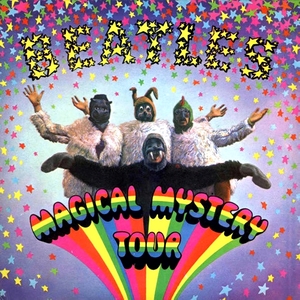
Magical Mystery Tour is a record by the English rock band the Beatles that was released as a double EP in the United Kingdom and an LP in the United States. It includes the soundtrack to the 1967 television film of the same name. The EP was issued in the UK on 8 December 1967 on the Parlophone label, while the Capitol Records LP release in the US and Canada occurred on 27 November and features an additional five songs that were originally released as singles that year. In 1976, Parlophone released the eleven-track LP in the UK.

"Lucy in the Sky with Diamonds" is a song by the English rock band the Beatles from their 1967 album Sgt. Pepper's Lonely Hearts Club Band. It was written primarily by John Lennon with assistance from Paul McCartney, and credited to the Lennon–McCartney songwriting partnership. Lennon's son Julian inspired the song with a nursery school drawing that he called "Lucy – in the sky with diamonds". Shortly before the album's release, speculation arose that the first letter of each of the nouns in the title intentionally spelled "LSD", the initialism commonly used for the hallucinogenic drug lysergic acid diethylamide. Lennon repeatedly denied that he had intended it as a drug song, and attributed the song's fantastical imagery to his reading of Lewis Carroll's Alice in Wonderland books.

Paul McCartney and Wings, often billed simply as Wings, were a British-American rock band formed in 1971 in London by former Beatles bassist and singer Paul McCartney, his wife Linda McCartney on keyboards, session drummer Denny Seiwell, and former Moody Blues guitarist Denny Laine. Wings were noted for their commercial successes, musical eclecticism and frequent personnel changes; going through three lead guitarists and four drummers. However, the core trio of the McCartneys and Laine remained intact throughout the group's existence.

"When I'm Sixty-Four" is a song by the English rock band The Beatles, written by Paul McCartney and released on their 1967 album Sgt. Pepper's Lonely Hearts Club Band. McCartney wrote the song when he was about 14, probably in April or May 1956, and it was one of the first songs he ever wrote. The song was recorded in a key different from the final recording; it was sped up at the request of McCartney to make his voice sound younger. It prominently features a trio of clarinets throughout.

Wild Life is the debut studio album by the British-American rock band Wings and the third studio album by Paul McCartney after the breakup of the Beatles. The album was mainly recorded in seven sessions between 24 July and 4 September 1971, at EMI Studios by McCartney, his wife Linda, session drummer Denny Seiwell, whom they had worked with on the McCartneys' previous album Ram, and guitarist Denny Laine, formerly of the English rock band the Moody Blues. It was released by Apple Records on 7 December in the UK and US, to lukewarm critical and commercial reaction.

Red Rose Speedway is the second studio album by the British–American rock band Wings, although credited to "Paul McCartney and Wings". It was released through Apple Records on 5 May 1973, preceded by its lead single, the ballad "My Love". By including McCartney's name in the artist credit, the single and album broke with the tradition of Wings' previous records. The change was made in the belief that the public's unfamiliarity with the band had been responsible for the weak commercial performance of the group's 1971 debut album Wild Life.

"Hello, Goodbye" is a song by the English rock band the Beatles, written by Paul McCartney and credited to Lennon–McCartney. Backed by John Lennon's "I Am the Walrus", it was issued as a non-album single in November 1967, the group's first release since the death of their manager, Brian Epstein. The single was commercially successful around the world, topping charts in the United States, the United Kingdom, France, West Germany, Canada, Australia and several other countries.

Wings at the Speed of Sound is the fifth studio album by the British–American rock band Wings, released on 26 March 1976. Issued at the height of the band's popularity, it reached the top spot on the US album chart—the band's fourth consecutive album to do so—and peaked at number 2 on the UK album chart. Both singles from the album also reached the top 5 of the UK and US singles charts, with "Silly Love Songs" reaching number 1 in the US.
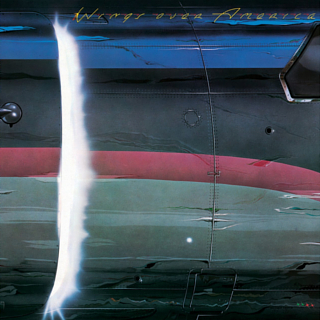
Wings over America is a triple live album by the British–American rock band Wings, released in December 1976. The album was recorded during the American leg of the band's 1975–76 Wings Over the World tour. It peaked at number 8 on the UK Albums Chart and reached number 1 on the US Billboard Top LPs & Tape chart.
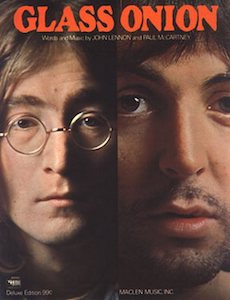
"Glass Onion" is a song by the English rock band the Beatles from their 1968 double album The Beatles. The song was written by John Lennon and credited to Lennon–McCartney.

"Sgt. Pepper's Lonely Hearts Club Band" is a song written by Paul McCartney, credited to Lennon–McCartney, released in 1967 on the album of the same name by the Beatles. The song appears twice on the album: as the opening track, and as "Sgt. Pepper's Lonely Hearts Club Band (Reprise)", the penultimate track. As the title song, the lyrics introduce the fictional band that performs on the album.

"Fixing a Hole" is a song by the English rock band the Beatles from their 1967 album Sgt. Pepper's Lonely Hearts Club Band. It was written by Paul McCartney and credited to Lennon–McCartney.

"She's Leaving Home" is a song by the English rock band the Beatles, written by Paul McCartney and John Lennon, and released on their 1967 album Sgt. Pepper's Lonely Hearts Club Band. Paul McCartney wrote and sang the verse and John Lennon wrote the chorus, which they sang together. Neither George Harrison nor Ringo Starr were involved in the recording. The song's instrumental background was performed entirely by a small string orchestra arranged by Mike Leander, and is one of only a handful of Beatles recordings in which none of the members played a musical instrument.

"Good Morning Good Morning" is a song by the English rock band the Beatles from their 1967 album Sgt. Pepper's Lonely Hearts Club Band. It was written by John Lennon and credited to Lennon–McCartney. Inspiration for the song came to Lennon from a television commercial for Kellogg's Corn Flakes. Another reference to contemporary television was the lyric "It's time for tea and Meet the Wife", referring to the BBC sitcom.
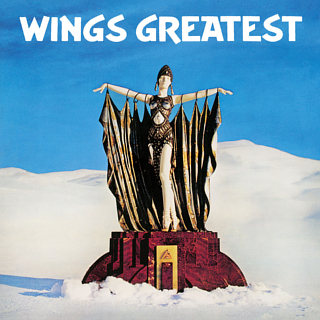
Wings Greatest is a 1978 compilation album by the British–American rock band Wings. It was the band's last release through Capitol in the US. The album is notable as being the first official retrospective release from Paul McCartney's post-Beatles career.

"Mary Had a Little Lamb" is a song written by Paul and Linda McCartney and released as a non-album single by the British–American rock band Wings in March 1972. It is based on the traditional nursery rhyme of the same name.
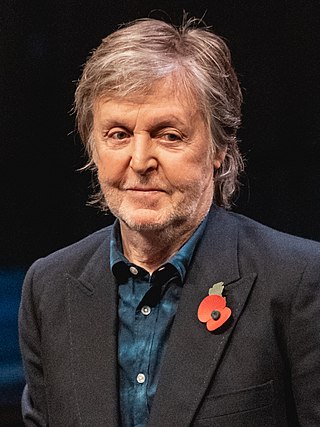
Sir James Paul McCartney is an English singer, songwriter and musician who gained worldwide fame with the Beatles, for whom he played bass guitar and shared primary songwriting and lead vocal duties with John Lennon. One of the most successful composers and performers of all time, McCartney is known for his melodic approach to bass-playing, versatile and wide tenor vocal range, and musical eclecticism, exploring genres ranging from pre–rock and roll pop to classical, ballads, and electronica. His songwriting partnership with Lennon is the most successful in modern music history.

















